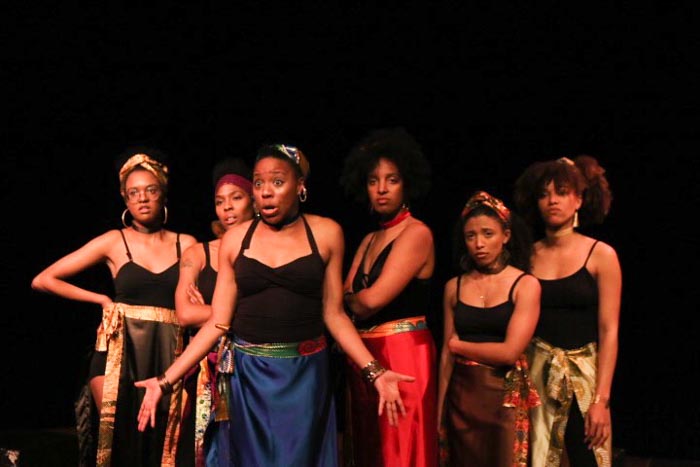“I was missin’ something,” begins Munyaradzi Guramatunhu’s note, introducing her rendition of the play for colored girls who have considered suicide when the rainbow is enuf in Tuesday Night Cafe Theatre’s (TNC) black and white program. “Something so important, something that ought to exist.”
Though the words were adapted from the play’s final poem, “a laying on of hands,” they rang especially true for the Zimbabwe native and first-time director as she reflected on her time at McGill. Guramatunhu’s show has the distinction of being McGill’s first all-black production, a fact that is more embarrassing than it is shocking.
McGill theatre is notoriously lacking in representation, a glaring weakness that is often defended under the guise of cultural neutrality, or lack of content. With for colored girls, Guramatunhu seeks to correct this inequality.
“A lot of what’s disguised as cultural neutrality is not cultural neutrality at all,” Guramatunhu said. “It’s actually white hegemony in practice.”
The soul-crushing effects of racial homogeneity in the media is one of the many subjects packed into the 90-minute play. Presented by TNC in conjunction with the Black Student’s Network, this adaptation of Ntozake Shange’s 1976 choreopoem explores themes of sex, love, abuse, and culture—demonstrating the ways that these universal subjects function in the worlds of young black women.
Located in the basement of Morrice Hall, just beneath the Islamic studies library, TNC’s theater is small, but the cramped room and shallow stage only serve to make the cast members’ performance even larger and more captivating. The six-person cast radiated energy as they transformed seamlessly from persona to persona, each more heartbreaking and believable than the last. Though Ines Vieux Francoeur is the only McGill-based actress, Guramatunhu promises that there will be many more opportunities for actresses of colour to represent McGill in the future.
The play is performed as a series of poems rather than divided into acts. Some of the stories are told in a linear fashion, while others unfold as a conversation. Several are accompanied by musical numbers, choreographed by Guramatunhu. Each of the poems illustrates a particular vignette or scene from a character’s life, written and performed so viscerally that they seem to have emerged from something more personal than a script. Despite the director’s lack of experience, the show is staged to near perfection—each scene tight and polished.
Although most of the stories revolve around broad themes of systemic injustice, the play narrows the scope of its narrative to focus on the intimate stories of individuals, rather than the politics surrounding the issues. Even the poem entitled “abortion cycle #1,” poignantly delivered by Keren Roberts, refreshingly forgoes the usual discursive tropes. Instead of addressing the issue from a legislative point of view, discussing the female body as though it were the subject of some convoluted bylaw, the play tells a story about what it feels like to get an abortion. The pain, the shame, and the isolation of receiving a medical procedure—too often disguised as a punishment—are all portrayed brilliantly onstage.
The cast refused to censor the ugliness of some of it’s subject matter, often at the expense of the audience’s comfort; performances were often troubling, but always authentic. Likewise, the poem, “latent rapists,” performed with heartbreaking vulnerability by Jamila Joseph, Benita Bailey and Keren Roberts, discusses the humiliation and loneliness felt by survivors, rather than trying to tackle the effects of the epidemic at large. Despite the tragedy and injustice that for colored girls depicts, the play is, above all, a celebration of black women and their strength and resilience.
“This is what it feels like to be at the bottom of the totem pole of so many societies,” Guramatunhi said. “But it’s also an act of therapy.”
Students can forward to more representational content from McGill’s theatre companies in the future.
“This is not a singular event,” Guramatunhi insisted. “This is just the beginning, the next play will be all black students from McGill.”
TNC’s for colored girls will show Wednesday to Saturday Night until November 25th at 7:30 pm in Morrice Hall, 3485 Rue McTavish. Tickets are $6 for students and $10 general admission.








“Guramatunhu’s show has the distinction of being McGill’s first all-black production, a fact that is more embarrassing than it is shocking.”
It is neither of those things to me.